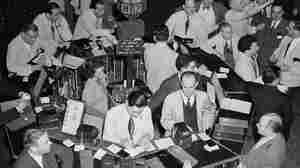

The Indicator from Planet Money
From NPR
A bite-sized show about big ideas. From the people who make Planet Money, The Indicator helps you make sense of what's happening in today's economy. It's a quick hit of insight into money, work, and business. Monday through Friday, in 10 minutes or less.
Most Recent Episodes
Workers on scaffolding lay blocks on one of the larger buildings at a development site where various residential units and commercial sites are under construction. Keith Srakocic/AP hide caption
President Donald Trump's latest round of tariffs took effect today. But are they legal? Andrew Harnik/Getty Images hide caption
Photo by Anna Moneymaker/Getty Images Photo by Anna Moneymaker/Getty Images hide caption
401(k)s have typically only invested in highly regulated publicly traded securities. What happens when private equity is thrown in the mix? Dan Grossi/AP Newsroom hide caption









